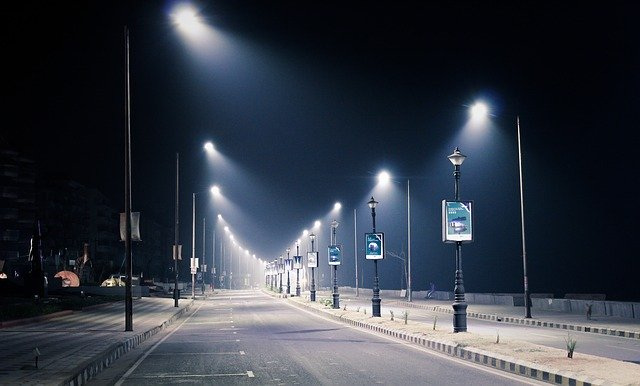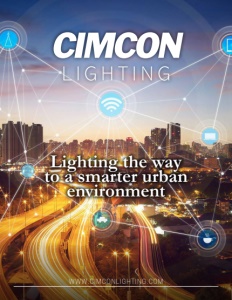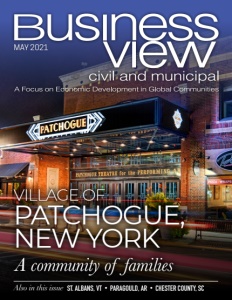CIMCON Lighting
Lighting the way to a smarter urban environment
Business View interviews Bob Flaherty, Senior Vice President of CIMCON Lighting, for our focus on Innovation and Sustainability in U.S. Cities
Through its smart lighting products and services, CIMCON Lighting is striving to create a smarter, safer, and more sustainable urban environment, one that truly embraces the vision of a “smart city.” Since its founding in 2012, the Massachusetts-based company has been helping cities and municipalities, and utility firms manage their energy usage, reduce disruption to their services, reduce maintenance costs and explore new ways of monetizing their streetlight infrastructure through the creation of a “street pole economy.” Today, the company is recognized as a global smart lighting and smart city technology leader.
CIMCON Lighting’s foundation is built on a 30+ year history of creating industrial controls for oil and gas companies, water treatment facilities and more. Originally a division of CIMCON Software, the company recognized that you could add a significant amount of value if you put something more intelligent on top of existing street lighting fixtures. In the years that have followed, this idea has evolved from control sensors to manage energy usage to something potentially much more revolutionary.
Bob Flaherty, Senior Vice President at CIMCON, and Heidi Sporel, Director of Marketing, recently spoke with Business View about the company’s plans to continue innovating, and the methods it employs to engage with its current and prospective customers.
Flaherty recounts, “The evolution of urban street lighting actually began when cities started to upgrade to LED fixtures from high-pressure sodium lighting, as these have a longer life, are more reliable and use less energy. The “intelligence” of these light fixtures could then be increased further by installing our intelligent controller on top of the streetlight pole. The intelligent lighting controls allow cities and utilities to implement flexible dimming schedules, monitor the health of the streetlight, further reduce energy usage, and enable a more proactive or pre-emptive maintenance model.”
Offering an example of how CIMCON’s smart lighting solution is employed, Flaherty explains that although streetlights are usually turned on at sunset, the brightness level can be varied through the night-time hours. “Many of our customers take advantage of the scheduling features in our product. When streetlights are switched on at or before sunset, they usually employ a high brightness level when the majority of people are traveling and moving about. Then, maybe around midnight, there’s usually far less activity out on the streets so you don’t need the same level of brightness. The scheduling capability of our intelligent controller can dim the lights to a predetermined level at a predetermined time. For example, between midnight and 5 am, you have the lights at half brightness – which for LED lights is still fairly bright – you’ve now reduced your energy usage during those hours where most people are sleeping. This is not possible with regular photocells unless a crew goes out to the fixture to adjust the light settings.” The result is a reduction in energy costs, as well as light pollution, and the city or utility is being a good steward of an important resource.

This touches upon one of the important benefits of CIMCON’s technology: environmental sustainability. Many cities have signed up to do ‘green’ initiatives, and smart lighting can reduce energy wastage. It is, however, not the only benefit to emerge from the use of smart lighting. “The other nice benefit made possible by the management software, Lighting Gale, and the lighting controllers are for special events,” says Flaherty. “The example I like to use here concerns the Boston area where there are several different festivals during the year. Wouldn’t it be great for lights to remain at a brighter level later in the evening during those festivals rather than remain on the usual daily schedule? This is easily set up thought our software.”
In terms of maintenance, CIMCON’s intelligent lighting controls are also hugely advantageous. “We can tell from the data we’re collecting if a fixture might be misbehaving and possibly malfunction in the near future,” Flaherty notes. “So, the controllers will send this data to our central management software (CMS) which then analyses the data and can take action such as sending an alert the city or the lighting department to go out to a specific location with a clear understanding of the issue and deal with that problem before it causes an outage.” Through a combination of CIMCON’s lighting controls and LightingGale CMS, cities can typically reduce maintenance and repair truck rolls from an average of almost three-trips per incident down to a single trip and eliminate the need for night-time patrols, resulting in tremendous cost savings, while maintaining resident safety.
The greater visibility that CIMCON provides into a city’s lighting network delivers concrete financial benefits. Flaherty reports, “Recently, one of our customers told us that over the past year, they saw a reduction in the number of truck roles (visits to the pole) from an average of 1,500 per year down to approximately 600. A truck role is typically initiated to visit lighting fixtures, based on complaints, to conduct maintenance or install replacements. An average city might spend roughly $300 per truck-roll at a minimum just to get the truck out there. With the data we’re collecting, we help cities either resolve a problem without sending somebody out or, when they do send somebody, we can help ensure they have the right parts, are aware of the exact problem, and can fix it in a single visit in most cases. Our technology reduced the average number of truck-rolls per incident from 2.9 down to 1.5. Added up across an entire city’s population of streetlights and possible incidents, this represents huge operational savings – every year!”
CIMCON sees its smart street lighting solution as the starting point for a broader smart city vision. A lot of cities are revamping their street lighting by installing LED lights and adding CIMCON’s smart lighting controller is a safe and straightforward choice to implement during the upgrade process as it simply plugs into the top of the streetlight fixture. The lighting controls help provide a more pleasing and attractive lighting experience, improve energy efficiency, and deliver a very tangible return on investment.
“One of the more interesting things about our smart streetlight controllers is they are network devices and can talk to, and through, each other. We started with solutions that build a secure and resilient mesh-based network to ensure data is delivered to our CMS application in the cloud consistently” says Flaherty. “Our cloud-based operations software, LightingGale, makes it very easy to access information, understand status and to drive real action. More recently, we’ve introduced controllers that communicate directly over traditional service provider networks like Verizon or T-Mobile and the data is sent directly into LightingGale. We are fairly unique in that we support a variety of networks and that allows a customer to choose what is right for them – we don’t believe one size fits all nor do we believe our customers should be locked into one type of network. We have a number of customers using a combination of our network options due to the varied terrain of the city and the distribution of the streetlights. Regardless of the network selected, once deployed an outdoor citywide network is now available. In essence we’ve created a canopy of data communication throughout the city just waiting to support services beyond smart streetlighting.”

The question now is what cities want to do with their new network capabilities. They could monitor air quality, keep track of traffic, or pursue more left-field plans. Flaherty suggests, however, that not all kinds of data are suitable to be transferred over a street lighting network. He explains, “There are certain kinds of data you wouldn’t want to put over a street lighting network. As with all networks, you need to ensure you can support the application in terms of speed, latency, security, resiliency and cost. Typically, most outdoor IoT networks, and smart streetlight controls fall into this category, are low bandwidth networks, so you aren’t going to want to use it to transfer video. We need to step back, just like we would before investing in any solution, and evaluate the requirements, trade-offs and potential value the various use cases can bring to the city or the utility that wants to build upon its street lighting network.”
This is something that CIMCON is already pioneering through its own smart city platform. “Our platform is called ‘NearSky and is comprised of the NearSky 360 edge processing hub and StreetVibe, our cloud-based software visualization software’,” says Flaherty. “We’re using the NearSky 360 to pull in data from all of these different sensors, like cameras, air quality monitors, and sound detectors, and collate that data into one place before sending it to the cloud. Just as with our streetlight controller, our NearSky 360 device plugs right into the top of the streetlight fixture, and then our controller plugs in on top of the NearSky – truly a plug and play solution.”
One of the major draws of the NearSky platform is from an interoperability standpoint. “There are a lot of logistical and cost obstacles to installing new sensors and smart solutions throughout the city,” Flaherty adds. “By plugging our NearSky platform into the top of a light pole, you can pull power from the fixture and meter that power and distribute it to the sensors that plug into the variety of interface ports on the NearSky 360. This solves the power problem for smart sensors. Additionally, all the data collected by these sensors can be pulled into the platform, processed if needed, and sent out over the lighting network that’s already in place or across an alternate network that is supported on the NearSky such as over an LTE connection and soon to be 5G. The smart city data can then be directed to our StreetVibe visualization application or to a city or utility’s Smart City or Smart Grid platform. Our value is that we make it very simple, fast and far less expensive to deploy multiple sensors throughout the city and drive more value from the smart streetlighting network.”
This value has been embraced by customers all over the world, with CIMCON currently present across more than 30 countries, with over 200 installations in major cities and close to 1.5 million streetlight controllers under contract. The company’s international presence owes much to the culture of innovation it has fostered over several years. “Internally, our CEO uses the phrase, ‘One CIMCON’ to emphasize that we have a really collaborative environment,” says Sporel. “We remain committed to satisfying our customers’ needs through our evolving technology and our belief in continually bringing new ideas to the table.”
Although COVID-19 has had an impact on how CIMCON markets itself, the company has always used virtual outreach to connect with a broad customer base – this is something that has continued throughout the pandemic. “We always start at an educational level,” Sporel explains. “Whether we’re talking to C-suite members, local mayors, city planners, CIOs, or the Department of Transportation, we customize our message appropriately. The most important thing is that we have a compelling story to tell, and I think with the products and services that CIMCON has to offer, that’s certainly the case.”
AT A GLANCE
CIMCON Lighting
What: A leading provider of smart streetlights and smart city platforms
Where: Burlington, Massachusetts
Website: www.cimconlighting.com


